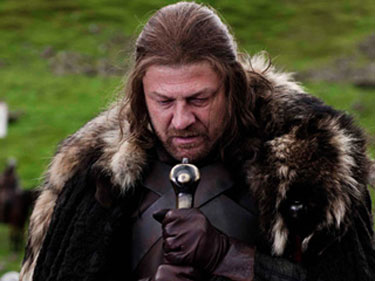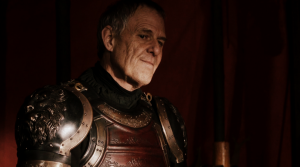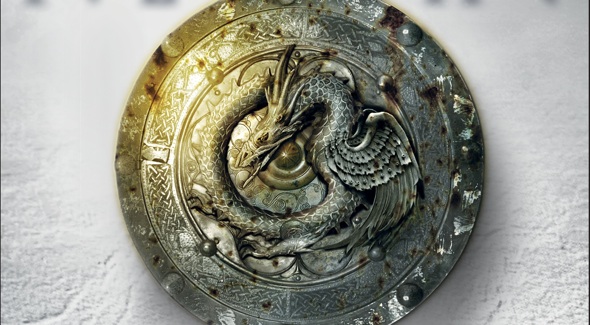All We Are is Words in the Wind
No examination of GRRM’s use of recurring language in ADWD would be complete without GRRM’s aphorism on language itself.

Gods above, more talk about language.
The phrase “words are wind” appears thirteen times in ADWD. Bear with me as I list them all:
- “Words are wind. Who is this bloody savior?” says Tyrion, when Illyrio Mopatis hints at the true identity of Young Griff.
- ”Words are wind, and the wind from Manderly’s mouth means no more than the wind escaping from his bottom.” So says Lord Godric, Lord of Sisterton, to Davos Seaworth. He’s referencing Lord Manderly’s vow to be revenged on the Freys.
- ”Words are wind,” says a woman in Wyman Manderly’s court. This is in response to Davos’s claim (and Stannis’s) that Joffrey Baratheon is the product of incest.
- ”Words are wind, even words like love and peace.” Daenerys Targaryen says this to Hizdahr zo Loraq, getting him to work his connections to bring peace to Meereen.
- ”Men are men, vows are words, and words are wind.” Iron Emmett says this to Jon Snow, Lord Commander of the Night’s Watch, in response to his plan to keep wildling women along the Wall.
- ”Words are wind […] No words of yours will secure this peace for Meereen.” Hizdahr turns Dany’s phrase against her, suggesting it will take a marriage to convince Yunkai that she means peace.
- ”That is good to hear […] but words are wind.” These are Prince Doran Martell’s words to his daughters – the same ones who tried to kidnap Myrcella in A Feast for Crows – to compel them to swear obeisance to him.
- ”Words are wind, and the wind is always blowing at the Wall,” says Jon Snow, to dismiss gossip being spread about him.
- ”Words are wind.” Theon Greyjoy says this to the wildling woman Rowan when she denies the charge of having murdered a boy in the northmen’s company.
- Words are wind, thinks Ser Barristan Selmy, comforting Missandei that Daenerys is safe and coming home soon.
- Words are wind, thinks Cersei Lannister, enduring the mocks of the crowd as she staggers naked through the streets of King’s Landing.
- She thinks this twice, actually.
- Finally, Ser Kevan Lannister, Hand of the King, says it to Ronnet Connington, nephew of Jon Connington, who has just invaded Westeros as the story ends.

Someone said 'words are wind.' Drink.
Again, no writer uses a phrase thirteen times by accident. And this is a phrase used by people in the North, the South and on both sides of the Narrow Sea: Daenerys Targaryen, Barristan Selmy, Theon Greyjoy, the Martells, the Manderlys, Jon Snow and Kevan Lannister. Everyone says it. It’s on everyone’s mind.
What does the phrase mean?
A speaker says or thinks “words are wind” to suggest that someone’s speech has no weight to it. Wind has no mass. You can’t build a house on it or trade it. Davos can’t prove the truth of his claims, Dany can’t prove her good intentions and Jon can’t prove what people say about him isn’t true. Words last no longer than it takes to say them.
But note that people only say this about speech. No one ever says it about writing. A letter, a treatise or an historical tome all contain words, but no one ever accuses a book of being wind. Westeros is a largely illiterate culture. The words on a page might as well be 256-bit encryption for your average lord or peasant. Yet those words have weight and power. It’s Jon Arryn’s letters, plus the books he used for research, that started this whole bloody war. Speech, we have cause to doubt.
And yet.
Jon Snow dismisses the rumors that other members of the Night’s Watch spread about him. Yet before he can ride off in disobedience of his vows, the Night’s Watch descends on him, stabbing him with daggers and leaving him to die at the foot of the Wall. “Words are wind,” observed Jon Snow, yet these words helped to kill him.
(Sidebar: though GRRM leaves the ending unclear, and has been known to yank death from the jaws of ambiguity, I’m fairly confident Jon Snow is actually dead. He’s stabbed at least four times by hardened warriors of the Night’s Watch. These aren’t the sort of men to leave a job half-done. That said, there are at least three means for Jon to come back from the dead within a dozen miles of where his body falls, so he may not be out of the equation yet)

Don't ... stab ... the hair.
“Words are wind,” says Lord Godric of Wyman Manderly, and yet Manderly’s plans for vengeance against the Freys run true. He spares Davos Seaworth, defying Queen Cersei’s orders and sneaking him out of White Harbor.
Words are wind, thinks Cersei Lannister as she parades naked through the streets of King’s Landing. Yet the words the smallfolk hurl at her do their damage. Cersei can not rule the city with the same regal pomp as before. Rule has to fall to Kevan Lannister, her uncle.
For such windy things, words still seem to carry a lot of force.
Perhaps everyone’s taking the wrong meaning from this old saw. It’s not unheard of. People misuse the exception that proves the rule or begging the question all the time. Perhaps everyone in Westeros uses the phrase “words are wind” to mean the opposite of what it says. Wind is far from harmless, after all. Cold wind cuts Stannis’s ranks to tatters before they can reach Winterfell. Wind carries ships across the sea, bringing Davos to White Harbor and taking Tyrion away from Daenerys. Wind brings the sound of war and the vectors of disease.
And the text supports this:
On the window seat a raven loitered, pale, huge, its feathers ruffled. It was the largest raven that Kevan Lannister had ever seen. Larger than any hunting hawk at Casterly Rock, larger than the largest owl. Blowing snow danced around it, and the moon painted it silver.
Not silver. White. The bird is white.
The white ravens of the Citadel did not carry messages, as their dark cousins did. When they went forth from Oldtown, it was for one purpose only: to herald a change of seasons.
“Winter,” said Ser Kevan. The word made a white mist in the air.
Winter means a changing of the winds. Though we’ve feared the coming of winter since the first chapter of A Game of Thrones, this is the first proof we have of its certainty. Every army in the world has been preparing for battle against foes on all sides. No one has been preparing for this. And the cold wind of winter arrives on the wind itself: on the wings of a raven.
Immediately after learning this, Kevan Lannister dies.

How much do crossbows hurt? On a scale of 1 to 10. Just asking.
The wind means more than we think, especially in Westeros. So it is that words mean more than people think. Jon Snow neglects his vows (his words, as they’re often called) and is killed. Tyrion’s words turn Aegon Targaryen back from the road to Meereen and on his way to Westeros, precipitating another war. The words of the smallfolk of King’s Landing strip Cersei of her last vestiges of power. The words of winter mean the end of Kevan Lannister and the end of peace in Westeros.
To say that “words are wind” should mean that words can shift the balance between great houses. But no one who says that believes it. They ignore the wind, focusing on their petty schemes as the snow creeps up around them. And all the while, winter is coming.

Nice analysis, although I would be wary about assigning too much significance to words like ‘leal’. I think GRRM has a penchant for pseudo-archaic language, and when he finds a term he likes he’ll just throw it in everywhere. Take ‘much and more’ (and the corresponding ‘little and less’). I’ve never come across either expression in any text ever, but ADWD is filled with them both. Similarly, ‘in half a heartbeat’ seemed to explode in use a couple of books ago.
On the other hand, he does do leitmotifs extremely well. My especial favourites were the two for Reek: ‘Reek, Reek it rhymes with…’ and ‘You’ve got to remember your name’.
Agreed, Wenyip, but I don’t think that takes away from the analysis. Yes, GRRM likes archaicism. But where he chooses to use archaicism and where he sticks with contemporary language is worth noting. He uses leal instead of loyal, but he never busts out yclept or hight. Why is that? Three thousand word OTI post. ;)
Also, I don’t recall him ever using leal, or at least not with this frequency, in any of the previous four books. Kind of reminds me of this: http://tvtropes.org/pmwiki/pmwiki.php/Main/AuthorVocabularyCalendar
When asked why he used “spavined”, a similarly archaic and out of place word, 17 times in one novel, Michael Chabon replied that it had just caught in his head and he had felt compelled to use it in the same way that he felt compelled to write, like a mild form of OCD. To create such gigantic epics, George R. R. Martin must have some level of compulsion to write. Maybe leal just caught in his head.
He used it a bit in Feast, but more so in the chapters that probably got split from ADWD.
You mean “Ned’s promise to Lyanna” in the first paragraph and not “Robert’s”, right? /picky bitch font
Yes.
Interesting article. Love the bit about words being wind, but still deadly. I feel as though Martin relied on the repetition motif more this time than he has with previous volumes. I wonder why that is, or if I’m just mistaken.
Now for my fanboy hat:
I agree with you that Jon is dead (for now). But part of that may be that I kind of WANT it to be the case. Don’t get me wrong, I love Jon and don’t want him to die, but I’m going to be kind of mad if we have to wait six years (being realistic here) to find out it was just a big tease. I’m more angry that we don’t have confirmation one way or the other than I am that it happened.
Still, one comment of yours stumped me. You said three ways he could come back. I count as a Wight, via Melisandre and Rh’llor, and…
What’s the third way?
As a skinchanger. It’s heavily implied that Jon Snow is a “warg,” able to project his consciousness into his direwolf. It’s also established in the prologue that, when a warg dies, his consciousness can transfer to one of his favored animals.
I’d say a third path for resurrection would be as a warg, most likely into Ghost.
Of course, another possibility is that he simply doesn’t die, he loses a lot of blood and comes close, but is ultimately nursed back to health.
Thanks, John. I should have seen that one right away.
Adrian, I agree with you in principle. The question then becomes: nursed by whom? If the Watch, or even just a significant portion of those present at Castle Black, have turned against him, it’s unlikely they’ll help. It could mean a Watch civil war of sorts. And recall, Jon sent most of his friends and the men he trusted away to man other castles.
Then there are the Queen’s Men. They aren’t his biggest fans either. Selyse seemed as though she’d just as soon see him removed from the office in favor of someone more tractable. In fact, if it weren’t for the fact that she seems pretty obedient to Stannis and his wish to have the wildlings move south, I’d almost suspect her of conspiring with Marsh. If Stannis were present it might be different… Melisandre is one who certainly seems to be in his corner, but I see her reviving him more than healing him, possibly even in secret.
That leaves the wildlings, his most obvious friends at this point. It’s only because of him (at least, in their eyes) that they are allowed to shelter behind the wall. In fact, given the numbers imbalance, it was pretty ballsy (or suicidal) for Bowen Marsh and his conspirators to attempt this. It can’t possibly do anything to stabilize the situation they find themselves in, presuming their assassination attempt was indeed successful.
Certainly though, as the author, there are enough factors in play that Martin can arrange for just about any situation he likes and spin it to believability. This is just how I read the situation.
Wun Wun. :)
I feel like GRRM naming an animal “Ghost” and offering a chance for Jon to warg into him after he dies aren’t coincidences.
Cool! I’d never considered that, Meghan. Sort of gives you chills.
I feel this way, exactly. It’s kind of ridiculous that GRRM waits until the last few chapters of a book that kept us waiting for so damned long, to do what he does best (killing off beloved characters.) Like you, I have no desire for Jon to actually be dead – he’s one of my absolute favorites. I was hoping for Tyrion, honestly (I know, I’m in the minority there…) I just think that it would be bullshit if he weren’t actually dead. If not, who died? Quentyn. That’s it. Kevan, too, yes – but that was in an epilogue. I know it’s got to be hard, this far along, to keep killing off characters that GRRM has grown to love as much as we, the audience, have… but to back away from it is kinda weaksauce.
Exactly. I just hate this new tendency toward the protracted “ooh, is he/she dead?” and then years later it turns out it was just a scare tactic. I guess technically he’s only done it with Brienne, but no one really believed she was dead, so it seemed a cheap ploy. Dude, I’m going to keep reading the books, I promise! You don’t need to fake me out! Glad to know I’m not alone in this thinking.
If Jon is dead, I am done with this series. He was one of the only remaining characters that I really liked. Even though I’m sick to death of the whole bringing people back from the dead thing, this is one case where it damn well better happen!
Excellent post! I’m not so sure about the written word being respected more than the spoken, though. Sure, Jon Arryn’s research started the war, but one of the people that research demonstrated to be illegitimate is still king. Robert’s written deathbed will naming Ned as regent didn’t do Ned much good. In ADWD, Theon takes a written treaty with him to Moat Cailin; it is scorned by the (illiterate) men there and ends up stuffed, unopened, in the mouth of one of their staked-out corpses after Ramsay kills them in (presumably) direct violation of its terms. Asha Greyjoy rags on her uncle, who is trying to give her valid historically-based advice, for nattering on about old books. The marriage contract between Dorne and House-Targaryen-in-exile turns out not to be worth the paper it’s written on. Etc. Written words are not wind, but maybe they’re just leaves (of paper)?
But no doubt I’m remembering selectively, and there are just as many counterexamples…
I’m suprised you don’t mention how the wilding woman Osha comments that the old gods answers are the rustiling of the leaves and the sound of the forest IE “the wind”. Therefore in this sense the wind is the will of the gods.
Another piece of evidence to support the conclusion that wind is indeed something to be reckoned with: the next book in the series is going to be called “The Winds of Winter.”
Nice article. But it begs the comment:
You know nothing, John Perich.
Great post! I had never thought about the use of the word leal in DwD because my native language is portuguese, and leal is actually the portuguese translation of loyal, so the word never seemed weird to me.
The repetition of “where the whores go?” however was bit more unsettling, but more because of the character that was constantly saying it. I didn’t interpret the repetition as “Zen attitude” or something like that, but more like a coping mechanism of some sort. I figured that killing his own father left Tyrion traumatized, and that made him obsess about his fathers last words.
Good article and despite being a fan, this has been one habit Martin keeps doing. It’s odd, but not always bad for the internal monologues of people, such as the constant, “Where do all the whores go?” playing on Tyrion’s mind, the “She’s been fucking Lancel and Osmund Kettleblack and probably Moon Boy for all I know” from Jaime in Feast, and so on.
A bunch of these have ended up becoming memes in my social group now that they’re all reading the books. There’s been a ton of, “It is known” and “Reek, rhymes with…”
So maybe there’s an intentional earwormishness to some of these phrases. It keeps playing on the mind of the reader like it does the cast.
I think the “Reek” bits and the “It is known” are more acceptable, because they’re more narrowly attributed (the first to one person only, the second solely to the Dothraki.)
Love the analysis of words as wind. Brilliant.
The one term that kept getting under my skin while reading ADWD was “jape.” I would LOVE to know an occurrence count on that one! I wonder if there is an actual, subtle, denotative difference between “jape” and “joke…” because, if not, my irritation with it is tenfold.
On the subject of Jon’s death, in addition to what I wrote upthread a bit, I’d like to argue that he *must* be dead, because of the law of threes. Martin is a skilled enough storyteller that he wouldn’t just ignore such a commonly accepted precept in his series. In ADWD, we have three possible death fake-outs, where we’re within the consciousness of the character, and he appears to all intents and purposes to have died. First, Tyrion fell in the water with the crazy stone-disease ridden guys. He really really seems dead, but a few chapters later, we get his perspective again.
Then, we have Quentyn Martell. GRRM ups the stakes, here. When he “comes back to life,” he ends up dying before the end of the chapter.
Anyway, the third time it happens, it’s Jon. There’s no “proof” that he’d died, so they had to arrest him. Crazy.
Wow, I have no idea what that last sentence means. Bedtime, for me at least.
Seriously, no posting after bedtime for me.
Let me sum up:
1st apparent (major character) death in ADWD – Tyrion. Result – Not dead, but keeps pricking himself to be sure. Clever, since he *is* somewhat of a prick.
2nd apparent death in ADWD – Quentyn. Result – Not dead, but then dies within the next chapter where we see him. So, a fake-out, but still ultimately dead.
3rd apparent death in ADWD – Jon. Result – kinda has to be all the way with this one… *especially* because GRRM plays the “rule of three” trump card by giving us a fourth iteration in which he flips the script: Kevan’s glaringly obvious, no way out death in the epilogue (or whatever that was).
Yes, that is what I meant to say, above, when I started talking all crazy.
Surely you Jape!
Not Jest… not Joke… but Jape…
Jape grates on my nerves to no end…
I kept waiting for the article to talk about it… but it did not so I will…
Just a few statistics (the power of search):
Total occurrences so far..
Jape – 109
Jest – 96
Joke – 18
By book:
Book 1; Jape-10 Jest-12 Joke-8
Book 2; Jape-11 Jest-28 Joke-6
Book 3; Jape-18 Jest-30 Joke-4
Book 4; Jape-26 Jest-12 Joke-0
Book 5; Jape-44 Jest-6 Joke-0
Some quick observations:
Clearly book 1 was the least funny of all the books with it’s lack of Japes/Jests/Jokes. Jokes are on the decrease while Japes are clearly on the rise. Jest is a bit of a funny one as it rises and falls.. but keep in mind it also the search also included instances of Jester, which isn’t quite the same as ‘jest’. For sure jape did not include any instances of ‘Japer’.
Take it for what it’s worth
“leal” did actually appear in the earlier books:
Book 3, once from Melisandre and later from Tyrion
Book 4, once from the author, twice from Cersei and once from Grand Maester Pycelle
Nice work! Martin must have got up to fourth gear by the time ADWD came around.
I loved reading this article, though I think you are giving GRRM far too much credit. I think maybe all of the repetition is an indicator/side-effect of the writer’s block he clearly suffered from while writing this book.
Let’s be honest, GRRM’s prose was never anything but above average at best. It was his story that people really cared about. Now that both have clearly taken a hit in this last installment, we can only hope for an inspired 6th book.
Can you do a write up explaining the gratuitous food lists/descriptions next?
The food list that springs to mind is Tyrion and Illyrio’s feast while they’re being carted about the Free Cities. I think that’s equal parts (1) to parallel the gasping poverty that Tyrion’s about to enter once he gets separated from the Griff family and (2) padding the page count.
Could he seriously think it needed padding?